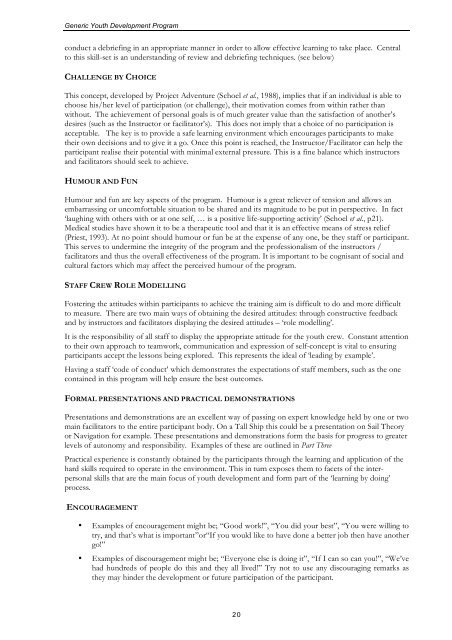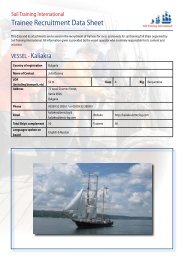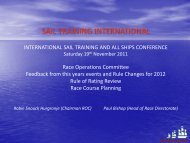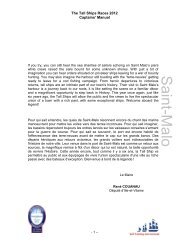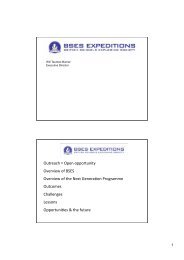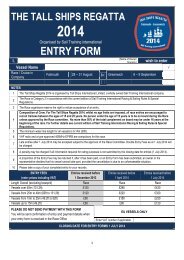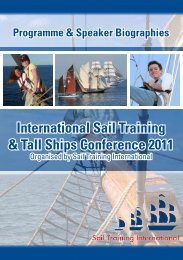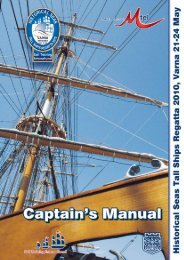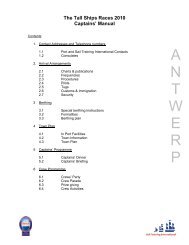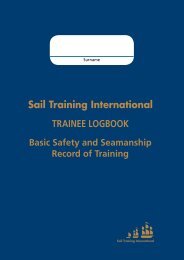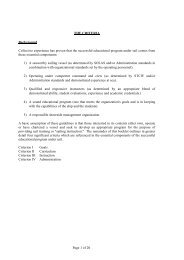Generic Youth Development Program Manual - Sail Training ...
Generic Youth Development Program Manual - Sail Training ...
Generic Youth Development Program Manual - Sail Training ...
You also want an ePaper? Increase the reach of your titles
YUMPU automatically turns print PDFs into web optimized ePapers that Google loves.
<strong>Generic</strong> <strong>Youth</strong> <strong>Development</strong> <strong>Program</strong><br />
conduct a debriefing in an appropriate manner in order to allow effective learning to take place. Central<br />
to this skill-set is an understanding of review and debriefing techniques. (see below)<br />
CHALLENGE BY CHOICE<br />
This concept, developed by Project Adventure (Schoel et al., 1988), implies that if an individual is able to<br />
choose his/her level of participation (or challenge), their motivation comes from within rather than<br />
without. The achievement of personal goals is of much greater value than the satisfaction of another’s<br />
desires (such as the Instructor or facilitator’s). This does not imply that a choice of no participation is<br />
acceptable. The key is to provide a safe learning environment which encourages participants to make<br />
their own decisions and to give it a go. Once this point is reached, the Instructor/Facilitator can help the<br />
participant realise their potential with minimal external pressure. This is a fine balance which instructors<br />
and facilitators should seek to achieve.<br />
HUMOUR AND FUN<br />
Humour and fun are key aspects of the program. Humour is a great reliever of tension and allows an<br />
embarrassing or uncomfortable situation to be shared and its magnitude to be put in perspective. In fact<br />
‘laughing with others with or at one self, … is a positive life-supporting activity’ (Schoel et al., p21).<br />
Medical studies have shown it to be a therapeutic tool and that it is an effective means of stress relief<br />
(Priest, 1993). At no point should humour or fun be at the expense of any one, be they staff or participant.<br />
This serves to undermine the integrity of the program and the professionalism of the instructors /<br />
facilitators and thus the overall effectiveness of the program. It is important to be cognisant of social and<br />
cultural factors which may affect the perceived humour of the program.<br />
STAFF CREW ROLE MODELLING<br />
Fostering the attitudes within participants to achieve the training aim is difficult to do and more difficult<br />
to measure. There are two main ways of obtaining the desired attitudes: through constructive feedback<br />
and by instructors and facilitators displaying the desired attitudes – ‘role modelling’.<br />
It is the responsibility of all staff to display the appropriate attitude for the youth crew. Constant attention<br />
to their own approach to teamwork, communication and expression of self-concept is vital to ensuring<br />
participants accept the lessons being explored. This represents the ideal of ‘leading by example’.<br />
Having a staff ‘code of conduct’ which demonstrates the expectations of staff members, such as the one<br />
contained in this program will help ensure the best outcomes.<br />
FORMAL PRESENTATIONS AND PRACTICAL DEMONSTRATIONS<br />
Presentations and demonstrations are an excellent way of passing on expert knowledge held by one or two<br />
main facilitators to the entire participant body. On a Tall Ship this could be a presentation on <strong>Sail</strong> Theory<br />
or Navigation for example. These presentations and demonstrations form the basis for progress to greater<br />
levels of autonomy and responsibility. Examples of these are outlined in Part Three<br />
Practical experience is constantly obtained by the participants through the learning and application of the<br />
hard skills required to operate in the environment. This in turn exposes them to facets of the interpersonal<br />
skills that are the main focus of youth development and form part of the ‘learning by doing’<br />
process.<br />
ENCOURAGEMENT<br />
• Examples of encouragement might be; “Good work!”, “You did your best”, “You were willing to<br />
try, and that’s what is important”or“If you would like to have done a better job then have another<br />
go!”<br />
• Examples of discouragement might be; “Everyone else is doing it”, “If I can so can you!”, “We’ve<br />
had hundreds of people do this and they all lived!” Try not to use any discouraging remarks as<br />
they may hinder the development or future participation of the participant.<br />
20


